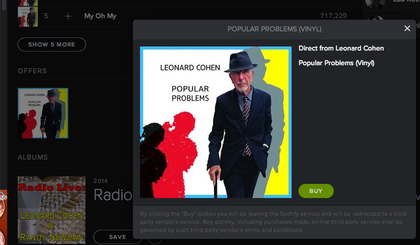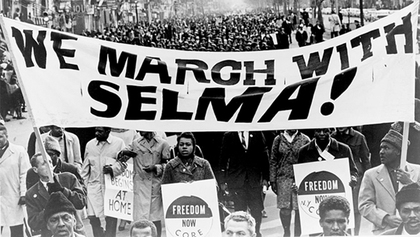How 2014 might be the most hopeful year in 66 million years or so
Amidst gloom-laced end-of-year summaries, I’ve decided to make like a salmon and swim against the flow with ten reasons why 2014 might be the most promising year in about 66 million years. Well there's one main reason really, but on this date of Netribution’s 15th birthday I have a small desire to know I can still get ‘down with it’ and write a list of ten, with numbers and everything, given that’s how people read things now.

I had just begun a second day of seemingly unstoppable tears over over the death of Robin Williams when I turned to a friend and asked if there had ever been such a terrible flood of news. From Syria and Isis, full of western Rambo-wannabes, raping and terrorising a too-long-suffering people, to Russia/Ukraine seemingly hot for the start of a new cold war; from Israel and Hamas returning to a never-ending tragic game of Paper-Scissors-Aerial-Bomabrdment to North Korea treating international diplomacy like some kind of drunken PMQs; from planes vanishing from the sky to the rampant spread of ebola; from Philip Seymour Hoffman to Maya Angelou, Gabriel Garcia Marquez to Bob Hoskins; from the ‘tip of the iceberg’ of institutionalised child abuse and murder - to the failure of our establishment to investigate itself in any form; from Fergusson and #Icantbreath to the truth of the Bush-Blair-era torture programme finally (thankfully) materialising; from the schools full of children killed or kidnapped for daring to study, to Nigel Farage being crowned Brit of the year in the latest attempt by Uncle Rupert to write our political narrative in the face of his fear over what a Milliband government might do to his ambitions. Charlie Brooker summed it all up pretty well in August arguing the universe owed us all some kind of epic Unicorn Chaser to balance everything out.
Then the unicorn came, and we all went wow for a little bit at the technical achievement, but much of the media seemed to miss the core of its significance and as we headed further and further towards the Christmas hurricane, it was forgotten. Looking back over the year, there seem to be other rays of hope that slipped through, which leaves me wondering if one of the biggest losses of our digital disintermediated time is the eye of a newspaper editor who serves up the morning news with a balanced weighting of good and bad to ensure we don’t run through the day in a state of perpetual panic that everything is about to end, as the internet’s echo chamber can often leave us feeling, any more than a stoned Sillicon Valley-esque elation that everything is awesome, please leave me alone in my dotcom bubble of self-reinforcing sentiment.
So here goes, 10 reasons why 2014 might turn out to be the best, or at least most promising, year for 66 million years or so.
1. Rosetta calling
66 million years ago, the Chicxulub Asteroid hit earth and killed all non-avian dinosaurs and made extinct three-quarters or more of plant and animal life on our planet. Over 75% of all species became extinct with a single rock hitting us from space.
If the earth had a mind or a will, you might picture it going back to the drawing board after that event and trying to design a new, nimbler species than the ever-more fierce dinosaurs. One with a bigger brain and agile, crafty fingers, and the ability to look up at the stars and dream.
And on 12 November 2014, our planet’s phantom quest to make sure such a catastrophic event could not happen again took possibly its biggest leap forward yet as the Rosetta lander approached a speeding comet, and landed on it. It’s been described as the engineering equivalent of landing a butterfly on a speeding bullet.
We may have near destroyed the earth to get to this point, and near-wiped ourselves out industrialising and inventing the nuclear bombs that could divert such an asteroid, but if nature - mother earth - was in the business of long-term self-preservation, after 66 milion years, you could say we’ve just made a major leap closer to that.
2. Climate progress
Another thing happened on the 12 Novemeber 2014. After decades of delays and dodges, China and America agreed to a huge ‘turning point’ deal to reduce their carbon emissions and the impact of climate change; China for the first time in history giving a fixed date for its emissions to peak at. While the Rosetta landing was a triumph of European cooperation, this deal, crafted in secret over several years and announced on the same day, appears a significant trumpet of Sino-Americna diplomacy, and hopefully is the nudge needed to make 2015’s Paris Climate Change conference a success.

3. Thich Naht Hanh
A third thing happened on 12 November 2014: the monk Thich Naht Hanh (Thay), had a brain haemorage and fell into a coma. A man of peace and tireless compassion, Martin Luther King said when nominating him for the Nobel Peace Prize, no-one had done more for peace than ‘this humble monk from Vietnam’. He has pioneered a concept known as 'engaged Buddhism' which is a form of Buddhism more engaged with the world’s problems than only meditating and focusing on the breath (for instance a multi-faith campaign to stop all human slavery by 2020). His illness, of course, is not good news, and around the world, his followers and fans have been making efforts to act peacefully and in mindfulness to encourage his recovery and continuation; the word from doctors so far is his condition and recovery is far better than any would expect.
Still, Thay is eighty-eight years old, and his death will come at some point. But as he says with clarity in this video on the fear of death, it is impossible for a cloud to die - it can only be transformed and continued in another form. And with this video is a second seed of hope - because whatever happens, whenever he passes, he is preserved in thousands of hours of video, online, free, for anyone to watch. This hasn’t really happened before now. Of course it’s possible to find archive footage of some of the 20th Century’s great social and spiritual beings, and many are preserved in their writings and testimony about them. But few seem to have been captured so carefully and broadly, and whatever happens, through these videos, he will continue his act of teaching, which seems a very 21st century form of continuation.
4. Tunisia
The birthplace of the Arab Spring seemed to reach maturity this year, firstly in March when the state of emergency was lifted, and then again in November and December when democratic parliamentary and presidential elections were peacefully and successfully held for the first time in the country’s history. Having rid itself of its dictator four years ago, the passing of two rounds of elections, between a ‘moderate left’ secular candidate linked to the old regime and the incumbent moderate Islamist president with a strong human rights history, is a considerable success in a region surrounded by uncertainty. Incumbent Moncef Marzouki’s graceful respecting of the democratic choice is another signal that Tunisia, in the words of the Guardian, is ‘the closest thing to a success story in the Arab Spring’ amidst Egypt’s return to dictatorship, Syria’s civil war and Libya’s spiralling chaos.
5. Indonesia
Just ten years after itsfirst democratic presidential election, the country with the world’s biggest Muslim population had its third election and surprised some observers by rejecting General Prabowo Subianto, from the country’s elite, for a new working class president, Joko Widodo in a closely fought election. Jokowi, as he is often known, comes from simple roots, having had to work through primary school to support his state education before starting work at age 12 for his father. Being evicted three times in his childhood informed his time later as mayor of Surakarta where he introduced health insurance for all citizens, and increased public transport and environmental protection. As governor of Jakartar he did much the same, introducing a universal healthcare program, and a big range of reforms from public transport, to funding of uniforms and books for poorer students. After his victory as President, Widodo - a big fan of rock music and grindcore apparently, and occasionally spotted at rock festivals - said that, growing up under the authoritarian and corrupt non-democractic ‘New Order’ of President Suharto he would have never expected someone with a lower-class background to become president saying: “now, it's quite similar to America, yeah? There is the American dream, and here we have the Indonesian dream”.
6. Cuba
One of the last battlegrounds of the cold war, finally came closer to peace as America announced the normalisation of relations with its long time post-war foe. Can more be said than that? “It’s like the falling of the Berlin wall, it’s a symbol that things can change very rapidly” said French Algerian writer, Nabila Ramadani. Here’s hoping that the closing of Guantanamo soon follows.
7. Be Kind Rewind: the rise of vinyl
 The ever faster escalation of technical modernity has left many - not least once-web-evangelists like myself - dizzy and bewildered, increasingly wondering if we’re moving too fast, too blindly. In the midst of this, came news that sales of vinyl records, for spinning analogue sounds, hit an 18-year high in the UK: not only good news for the beleaguered independent music world, but a sign that new might not always win (which brings us inevitably back to Toy Story). Several friends this year have lamented throwing out their VHS collections, talking wistfully about the unique potential distortion that only a slightly worn VHS tape can bring and even more talking of the joy of making and receiving a mix tape against the effortless banality of sharing a digital playlist. I’ve also quite enjoyed the unsettling experience of having to use a 7-year old Nokia phone after losing my iPhone during some festive excess: in short, I spend more time away from the screen and feel better for it.
The ever faster escalation of technical modernity has left many - not least once-web-evangelists like myself - dizzy and bewildered, increasingly wondering if we’re moving too fast, too blindly. In the midst of this, came news that sales of vinyl records, for spinning analogue sounds, hit an 18-year high in the UK: not only good news for the beleaguered independent music world, but a sign that new might not always win (which brings us inevitably back to Toy Story). Several friends this year have lamented throwing out their VHS collections, talking wistfully about the unique potential distortion that only a slightly worn VHS tape can bring and even more talking of the joy of making and receiving a mix tape against the effortless banality of sharing a digital playlist. I’ve also quite enjoyed the unsettling experience of having to use a 7-year old Nokia phone after losing my iPhone during some festive excess: in short, I spend more time away from the screen and feel better for it.
I’m not sure how far the VHS revival will go, but as we wait for the bugs of Web 1 & 2 to be fixed (anyone?) before diving into the decentralised universe of Web Three or Web Free or whatever it is called (“1 = content is king; 2 = conversation is king; 3 = context is king” according to some); then taking our foot off the digital accelerator a bit seems to perhaps be the safest thing we can do with such an insanely powerful and addictive array of digital tools. Spotfiy appear to already be on the case - offering alongside the subscription music, buy-it-now links for vinyl albums directly from the artist. Perhaps Michel Gondry’s film https://www.youtube.com/watch?v=J7C8nHAAs70 about a community uniting to recreate their favourite films when a video store’s tapes get erased, is a decent parable for how to get through our all-pervasive digital times - to turn back a little from the new, and towards that which is timeless - our communities, storytelling, music making, the physical - each other, may help usget through this huge techno-socio transition without becoming enslaved or belittled by the machines we spend so much time with.
8. A new feminism rises in a democratised media
There’s two ways to tell the narrative of feminist voices online this last year. There’s the shock and natural horror at the abuse and death threats people like Anita Sarkeesian or Zoe Quinn experienced for having a voice and getting it heard, alongside the wider online trolling and abuse suffered by so many more.
But there’s also the more surprising narrative that after decades of a media-driven lad culture, and amidst a huge growth in online porn - there’s an increasingly well informed and much more mainstream feminist debate. The Bechdel test is in many people’s lexicons, and before this year the idea of pickup artist ’gurus’ having their visas revoked might have seemed fanciful. At the Nordic Indie Video Game conference (a region responsible for many of the worlds biggest games), the issues raised by Sarkeesian and other critics of the sexism of video games was referred to as indisputable gospel truth; albeit from mostly male speakers and developers. Different kinds of games are continuing to emerge; indeed some explore mental health problems, eating disorders and writers block.
While online trolling has lifted the lid on the kind of language that men have been using for years if not centuries, as is sometimes said there’s no better medicine than sunlight. With such attitudes under the brighter glare of wide public opinion, perhaps the process of challenging deeply entrenched sexist, racist and privileged opinions can begin. Hopefully this happens in a way that is understanding of the fact many prejudices are embedded at a young age, that many men are raised around violence, misogyny and aggression, praised when they behave like winning fighters and seducers, laughed at for their sensitivity - by men and women - and that re-education, while always possible, probably cannot take place while under attack.

This engagement by a majority whose voice has long been under-represented, empowered by the web and platforms like Twitter where all voices have an equal weight on one level - supports protests like Occupy and huge backlash against police injustices (#icantbreathe) forming arguably a radically new form of direct democracy, which continues to shake and frighten old power structures. It's one of the reasons Ava DuVernay's star-studded Martin Luther King biopic Selma looks so exciting - her success as a publicist-turned-writer-director-self-distributor has been supported by this more democratic toolset (her keynote at Film Independent Forum is also well worth a watch).
9. The 85%: political re-engagement
While the Scottish Independence Referendum was inevitably going to leave around half of the country disappointed, both sides - and the rest of the UK - could agree on the remarkable outpouring of democracy that took place. The turnout in the referendum of 84.5% - reaching 91% in some counties - was the highest in any UK poll since the 1930s. It illustrated, much to the surprise of some pundits, quite how much people care about politics when they think real change is at stake.
Travelling Denmark and Sweden earlier this year I was surprised to learn that both countries also typically get 80-90% turnout at their elections. This isn’t enforced by making it illegal not to vote as in Australia, but rather is built on a genuine sense with each voter that every vote counts. Scandinavian politics is rooted in coalitions, with a full spectrum of political parties from communist and feminist to religious and far right, and most importantly, with proportional representation, so any party with more than a few percent of votes can be guaranteed representation. People are left in no doubt that their vote matters, on some level.
In Britain we are a good way off proportional representation (and the number of right/far right MPs that it might bring with it doubtless scares many off it). But more and more politicians now suggest that opening the vote to 16 year-olds - as happened in Scotland - must take place; while all parties promise a restructured parliament after May 2015. The challenge for all will be ensuring that such levels of engagement become the new normal, not just the fleeting hopes of a generation, ready to fall back into cynicism and apathy as some established powers may desire.
10. Piketty settled it
In his mammoth book published this year, it would seem from all reviews I've seen (Cory Doctorow's was my favourite) that Piketty answered categorically and with comprehensive evidence the question of whether the neoliberalism of the last 30 years or so has offered benefits for anyone other than the already rich (tl:dr: it doesn’t). I’ve not read the book, and confess I have found even just the very act of holding it and trying to begin the important journey into its pages cured several nights’ insomnia. I await the film remake.
While he might not offer an alternative solution, Piketty does seems to have proven beyond doubt the nature of the problem. The next person who tries to argue that Thatcher-Reagen-era neoliberal capitalism has a trickle down effect that helps anyone but the already wealthy, now can be comprehensively out-argued through cold, hard reason: no need for raised voices on the subject any more.
11. If there must be a Spintal Tap-esque 11, well, we’re all still here.
Small comfort perhaps if you are living in a refugee camp, queuing for a soup kitchen, recovering from the aftermath of a war or famine or disease or any of the other untold sufferings hundreds of millions of people face on a daily basis. But for those of us able to stop and breathe, to watch the weather or the traffic or the trees or the person on the desk opposite, we are still here. It’s a miracle. World War Three hasn’t broken out. We are one step closer to ensuring an asteroid won’t wipe out the majority of the planet’s life. And now that our actions and words are becoming frozen in time digitally, how we all continue to act in this unique period where 7 billions souls all get networked up, and all gradually get to have a voice, may never be forgotten.
Looking to 2015: a year of questions
Of course all of these reasons for hope are conditional. If no deal is made in the Paris Climate Talks, or the new US Congress vote to undo Obama’s recent pledges, who cares that vinyl sales are recovering. If 2014 was a year of hope, bursting between the dark shadows of the four horsemen, 2015 looks like a year of some of the biggest - as yet unanswered - questions.
Will the economic ‘readjustment’ from the latest debt bubble come before or after the UK election; and would the yellow in a so-called Traffic Light Coalition be the Lib Dems, the SNP or both? Which in turn feeds into the question faced by the 26% of the UK who would vote green if they thought they had a chance of getting in - how big could that green light be? Will the EU really go to war with Google, as it threatens, and small online traders under VATmoss, as it has legislated for; and what will become of Farage if he doesn’t get in to Westminster, or, indeed, if he does?
Will the next presidential campaign be a new round of Clinton vs Bush, or something different? Will the falling price of oil continue to hurt the fracking and deep-water, arctic drilling industry or is it a forbear of bigger, weirder economic turmoil? Will Putin’s new found love signal a thaw in relations with his more provocative neighbours and will Kim Jong Un’s Obama-racism be the step too far for ‘godparents’ China? Will Iran sign up to a nuclear deal and will the Iraq-Iran-Syria coalition, supported by the West, push back ISIS or act as recruitment tool? Will Ebola stabilise and fall under control, and will Channel 4 dare make a third series of Utopia if it doesn’t?
And will Ed Milliband become the first bacon-sarnie eating Jewish prime minister, only the second Jewish-born leader since Disraeli, and would he follow through on his commitment to be the first British PM to recognise the state of Palestine if he did. Indeed would his holocaust-surviving family history help his pro-Palestinian policies carry the gravitas in Israel that helped nudge the political breakthrough much of the world is waiting and praying for? And before that will Israel vote to the left or even further to the right in their March elections?
But much bigger than any of these questions - yet somehow linked to all of them - is what happens in the Paris climate talks in November. Does the world collectively vote for the first time to decisively cap and reduce carbon? Or not. And what on earth do we do if no deal is reached?
Quoting futurist and science fiction writer Kim Stanley Robinson, “That’s the whole story of the 21st century: Are we a sane civilization or not?”